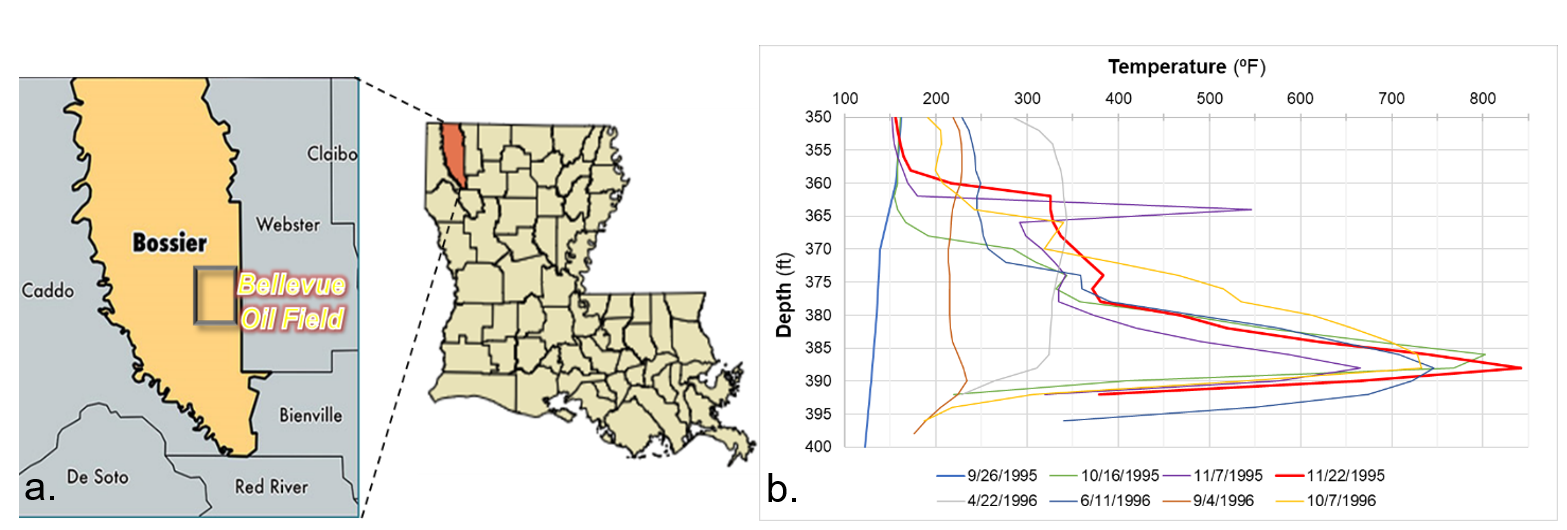Research
Our research collaborators and sponsors include:

Fiber Optic Sensing
Over the past few years, the oil and gas industry has seen a rapid increase in the deployment of optical fiber-based distributed acoustic sensors (DAS) and distributed temperature sensors (DTS) for real-time downhole monitoring in both onshore and offshore operations. Distributed fiber-optic sensors can provide real-time information, simultaneously along the entire fiber length. This technology can be used for leak detection and well integrity monitoring, injection/production profiling (to understand where the fluids are coming from), sand detection, monitoring fractures, sand detection, etc. Research in our group focuses on developing novel signal processing and machine learning workflows for analyzing fiber optic data. Ongoing projects involve DAS and DTS experiments in the well-scale PERTT facility (at LSU) and surface flow-loop testing at Oak Ridge National Lab and at LSU. Dr. Sharma is collaborating with a number of major E&P companies. To further expand the capability of current fiber optic systems, we are developing custom engineered fiber, quantum laser sources and nanomaterial enhanced sensors.

(a) Waterfall plot of high-frequency DAS Frequency Band Energy (b) Low-frequency DAS gradient w.r.t. time (c) Frequency-Wavenumber Plot
Hydrocarbon Mapping Using Satellite Gravimetry
In an ongoing project in collaboration with NASA, we are utilizing satellite-based and land-based gravity data for hydrocarbon mapping using super-resolution image enhancement and machine learning techniques.
 (a) Satellite based gravity earth model using GRACE data (b) Land-based gravity data
from USGS.
(a) Satellite based gravity earth model using GRACE data (b) Land-based gravity data
from USGS.
Enhanced Oil Recovery
Dr. Sharma has over eight years of industry experience in Enhanced Oil Recovery (EOR) through her previous work at Chevron, Shell, and Schlumberger. Ongoing EOR projects in our group include analysis of fireflood (in-situ combustion) operations in Louisiana (figures below), steam injection and production profiling in steamflood and cyclic steam injection operations, and gas injection in shale reservoirs.
 (a) Location of fireflood operation in the Bellevue oil field in Louisiana (b) Typical
temperature profile in an air injector reaching above 800 degF.
(a) Location of fireflood operation in the Bellevue oil field in Louisiana (b) Typical
temperature profile in an air injector reaching above 800 degF.
Machine Learning
We are utilizing machine learning, data mining and numerical optimization techniques for a variety of applications in the oil and gas industry. In an ongoing project (figures below), we used random forest algorithm to predict time-lapse saturation profiles using actual field injection and production data from a structurally complex, heterogeneous, and heavily faulted offshore oil field achieving high accuracy.
 (a) 3D reservoir view showing the horizontal permeability and structural location
of wells (b) Intersection of well paths with faults (c) Predicted versus the actual
time-lapsed oil saturation profiles.
(a) 3D reservoir view showing the horizontal permeability and structural location
of wells (b) Intersection of well paths with faults (c) Predicted versus the actual
time-lapsed oil saturation profiles.
Online Portal for Oil and Gas in Louisiana
The energy industry in Louisiana is one of the biggest in the U.S. Louisiana is one of the top five natural gas-producing states in the U.S. and one of the top 10 states in both crude oil reserves and annual crude oil production. In collaboration with the Louisiana Department of Natural Resource and LSU Libraries, we have developed an easy-to-use online web-portal on a GIS platform to visualize the oil and gas resources in Louisiana. Currently we are utilizing data mining techniques on the production database to decipher production trends and identify optimization opportunities. The portal is available at https://la-oilgas.pete.lsu.edu/la-oilgas/
